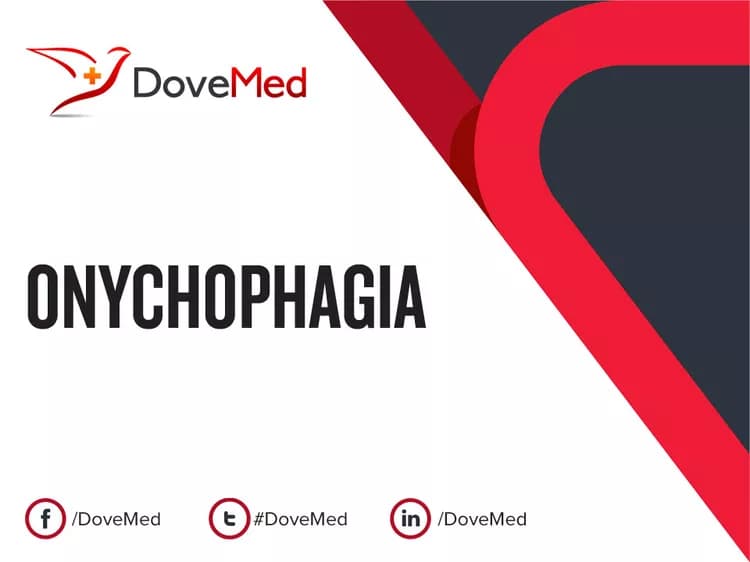What are the other Names for this Condition? (Also known as/Synonyms)
- Nail-Biting
- Onychophagy
What is Onychophagia? (Definition/Background Information)
- Onychophagia is a common condition of biting one’s nails. In this condition, an individual habitually and regularly bites the finger nails and soft tissues of the nail bed. It is mostly observed in children and adolescents and may be stress-induced
- Onychophagia, also known as Nail-Biting, is associated with a host of psychological conditions including obsessive compulsive disorder and attention deficit hyperactivity disorder (ADHD)
- Onychophagia can lead to nail and soft tissue infections. In addition to deformed nails, the child may also present gum injury, jaw pain, and teeth abnormalities
- Onychophagia is treated by addressing the cause of the condition, which may involve psychotherapy. Other measures that aid in arresting Nail-Biting, such as the use of suitable dental restraints and bitter-tasting nail polish, may also be attempted
- The prognosis of Onychophagia depends on factors that include the severity of any associated condition and treatment response. However, in general, the prognosis is good
Who gets Onychophagia? (Age and Sex Distribution)
- Onychophagia is common during childhood and adolescence, although it may be seen in a wider age group and adults may also be prone to Nail-Biting
- Both males and females may be affected
- Individuals of all racial and ethnic background may be affected
What are the Risk Factors for Onychophagia? (Predisposing Factors)
Currently, no definitive risk factors have been identified for Onychophagia other than stress. But, it is reported to be linked to the following conditions/disorders:
- Obsessive compulsive disorder
- Attention deficit hyperactivity disorder (ADHD); up to 75% individuals with ADHD may have Onychophagia
- Separation anxiety disorder
- Trichotillomania (hair-pulling disorder)
- Skin-eating disorder (dermatophagia)
It is important to note that having a risk factor does not mean that one will get the condition. A risk factor increases ones chances of getting a condition compared to an individual without the risk factors. Some risk factors are more important than others.
Also, not having a risk factor does not mean that an individual will not get the condition. It is always important to discuss the effect of risk factors with your healthcare provider.
What are the Causes of Onychophagia? (Etiology)
- The exact cause of Onychophagia is unknown, but it may be probably related to stress
- Children may resort to biting their nails as a measure of stress-relief
- Onychophagia may also be associated with a host of underlying psychological conditions
What are the Signs and Symptoms of Onychophagia?
The signs and symptoms of Onychophagia include:
- Chronic and compulsive biting of one’s nails and nail beds
- This can cause damage to the nail and soft tissues surrounding the nail
- Bleeding of soft tissues
- Painful fingers
How is Onychophagia Diagnosed?
A diagnosis of Onychophagia may involve the following:
- A thorough medical history and physical examination
- Clinical examination of the signs and symptoms is normally sufficient to make a diagnosis of Onychophagia
- Suitable tests and procedures may be undertaken to identify any associated disorder
Many clinical conditions may have similar signs and symptoms. Your healthcare provider may perform additional tests to rule out other clinical conditions to arrive at a definitive diagnosis.
What are the possible Complications of Onychophagia?
Onychophagia may lead to the following complications:
- Malformed nails
- Infection of the nail and surrounding soft tissue; increased risk of parasitic infections
- Stomach infections due to swallowing nail particles and dirt
- Teeth abnormalities in children
- Pain in the temporomandibular (TMJ) joint or jaw joint
- Injury to the gums
- Feeling distressed, social isolation
How is Onychophagia Treated?
The treatment of Onychophagia may involve the following procedures:
- Addressing underlying stress or stress-related disorders
- Psychotherapy: It can be either individual-based or group therapy. The techniques may include the following:
- Cognitive behavioral therapy (CBT): It is a form of psychotherapy that focuses on changing harmful thinking patterns, feelings, and behavior
- Dialectic behavior therapy: This form of psychotherapy is for individuals with severe personality disturbances. It is designed to help change one’s patterns of behavior that are not helpful
- Interpersonal psychotherapy (IPT): This form of psychotherapy focuses on interpersonal issues. The targets of IPT include improving interpersonal communication and increased social support
- The treatment may involve not only the affected individuals, but also enlist the support of one’s close friends and family members
- Treating infections by using antibiotics
- Use of nail polish that tastes bitter; this technique may not be very effective in many cases
- Use of dental device (to front teeth) that may decrease the ability to bite one’s nails
How can Onychophagia be Prevented?
Currently, there are no known methods to prevent Onychophagia, although future incidences may be controlled. Such measures to prevent further Nail-Biting incidences may include the following:
- Support groups: Support groups can be established to help cope with the symptoms and improve the quality of one’s life
- Stress management: Stress management can help deal with Nail-Biting episodes and reduce its frequency
- Family members and close friends can provide non-judgmental support and encourage their loved ones to seek early treatment for this potentially serious condition
What is the Prognosis of Onychophagia? (Outcomes/Resolutions)
- The prognosis of Onychophagia depends upon the severity of the condition, the treatment response to associated condition, and other factors
- The prognosis is generally good with appropriate treatment. A better understanding of the condition helps achieve better outcomes
Additional and Relevant Useful Information for Onychophagia:
- Attention deficit hyperactivity disorder (ADHD) is a neurodevelopmental disorder that begins in childhood. It is characterized by inattention, hyperactivity, and impulsivity (acting without thinking about the consequences)
Related Articles
Test Your Knowledge
Asked by users
Related Centers
Related Specialties
Related Physicians
Related Procedures
Related Resources
Join DoveHubs
and connect with fellow professionals



0 Comments
Please log in to post a comment.